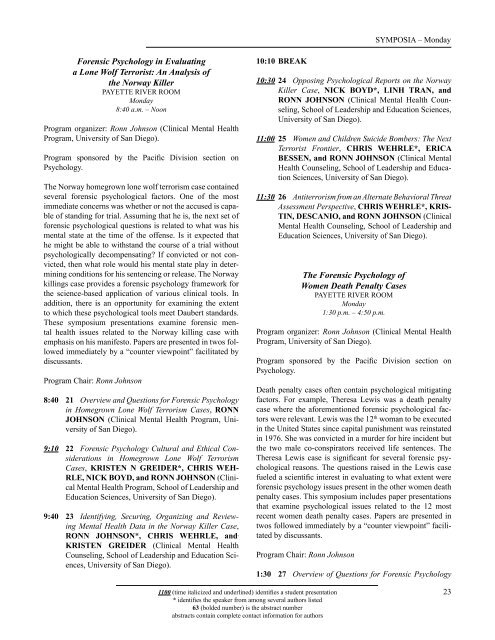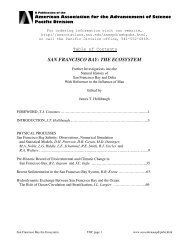Vol 31, Part I - forums.sou.edu ⢠Index page - Southern Oregon ...
Vol 31, Part I - forums.sou.edu ⢠Index page - Southern Oregon ...
Vol 31, Part I - forums.sou.edu ⢠Index page - Southern Oregon ...
You also want an ePaper? Increase the reach of your titles
YUMPU automatically turns print PDFs into web optimized ePapers that Google loves.
SYMPOSIA – Monday<br />
Forensic Psychology in Evaluating<br />
a Lone Wolf Terrorist: An Analysis of<br />
the Norway Killer<br />
payette river room<br />
Monday<br />
8:40 a.m. – Noon<br />
Program organizer: Ronn Johnson (Clinical Mental Health<br />
Program, University of San Diego).<br />
Program sponsored by the Pacific Division section on<br />
Psychology.<br />
The Norway homegrown lone wolf terrorism case contained<br />
several forensic psychological factors. One of the most<br />
immediate concerns was whether or not the accused is capable<br />
of standing for trial. Assuming that he is, the next set of<br />
forensic psychological questions is related to what was his<br />
mental state at the time of the offense. Is it expected that<br />
he might be able to withstand the course of a trial without<br />
psychologically decompensating If convicted or not convicted,<br />
then what role would his mental state play in determining<br />
conditions for his sentencing or release. The Norway<br />
killings case provides a forensic psychology framework for<br />
the science-based application of various clinical tools. In<br />
addition, there is an opportunity for examining the extent<br />
to which these psychological tools meet Daubert standards.<br />
These symposium presentations examine forensic mental<br />
health issues related to the Norway killing case with<br />
emphasis on his manifesto. Papers are presented in twos followed<br />
immediately by a “counter viewpoint” facilitated by<br />
discussants.<br />
Program Chair: Ronn Johnson<br />
8:40 21 Overview and Questions for Forensic Psychology<br />
in Homegrown Lone Wolf Terrorism Cases, RONN<br />
JOHNSON (Clinical Mental Health Program, University<br />
of San Diego).<br />
9:10 22 Forensic Psychology Cultural and Ethical Considerations<br />
in Homegrown Lone Wolf Terrorism<br />
Cases, KRISTEN N GREIDER*, CHRIS WEH-<br />
RLE, NICK BOYD, and RONN JOHNSON (Clinical<br />
Mental Health Program, School of Leadership and<br />
Education Sciences, University of San Diego).<br />
9:40 23 Identifying, Securing, Organizing and Reviewing<br />
Mental Health Data in the Norway Killer Case,<br />
RONN JOHNSON*, CHRIS WEHRLE, and ,<br />
KRISTEN GREIDER (Clinical Mental Health<br />
Counseling, School of Leadership and Education Sciences,<br />
University of San Diego).<br />
10:10 BREAK<br />
10:30 24 Opposing Psychological Reports on the Norway<br />
Killer Case, NICK BOYD*, LINH TRAN, and<br />
RONN JOHNSON (Clinical Mental Health Counseling,<br />
School of Leadership and Education Sciences,<br />
University of San Diego).<br />
11:00 25 Women and Children Suicide Bombers: The Next<br />
Terrorist Frontier, CHRIS WEHRLE*, ERICA<br />
BESSEN, and RONN JOHNSON (Clinical Mental<br />
Health Counseling, School of Leadership and Education<br />
Sciences, University of San Diego).<br />
11:30 26 Antiterrorism from an Alternate Behavioral Threat<br />
Assessment Perspective, CHRIS WEHRLE*, KRIS-<br />
TIN, DESCANIO, and RONN JOHNSON (Clinical<br />
Mental Health Counseling, School of Leadership and<br />
Education Sciences, University of San Diego).<br />
The Forensic Psychology of<br />
Women Death Penalty Cases<br />
payette river room<br />
Monday<br />
1:30 p.m. – 4:50 p.m.<br />
Program organizer: Ronn Johnson (Clinical Mental Health<br />
Program, University of San Diego).<br />
Program sponsored by the Pacific Division section on<br />
Psychology.<br />
Death penalty cases often contain psychological mitigating<br />
factors. For example, Theresa Lewis was a death penalty<br />
case where the aforementioned forensic psychological factors<br />
were relevant. Lewis was the 12 th woman to be executed<br />
in the United States since capital punishment was reinstated<br />
in 1976. She was convicted in a murder for hire incident but<br />
the two male co-conspirators received life sentences. The<br />
Theresa Lewis case is significant for several forensic psychological<br />
reasons. The questions raised in the Lewis case<br />
fueled a scientific interest in evaluating to what extent were<br />
forensic psychology issues present in the other women death<br />
penalty cases. This symposium includes paper presentations<br />
that examine psychological issues related to the 12 most<br />
recent women death penalty cases. Papers are presented in<br />
twos followed immediately by a “counter viewpoint” facilitated<br />
by discussants.<br />
Program Chair: Ronn Johnson<br />
1:30 27 Overview of Questions for Forensic Psychology<br />
1100 (time italicized and underlined) identifies a student presentation 23<br />
* identifies the speaker from among several authors listed<br />
63 (bolded number) is the abstract number<br />
abstracts contain complete contact information for authors








